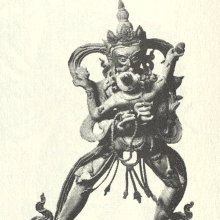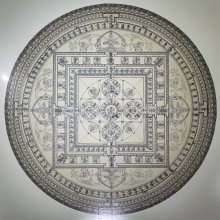Budha, Buḍhā, Būḍhā: 33 definitions
Introduction:
Budha means something in Buddhism, Pali, Hinduism, Sanskrit, Jainism, Prakrit, Marathi, Hindi. If you want to know the exact meaning, history, etymology or English translation of this term then check out the descriptions on this page. Add your comment or reference to a book if you want to contribute to this summary article.
Images (photo gallery)
In Hinduism
Natyashastra (theatrics and dramaturgy)
Source: archive.org: The mirror of gesture (abhinaya-darpana)One of the Nava-graha (Hands that indicate the Nine Planets).—Budha: left hand–Muṣṭi askew, right hand–Patāka.

Natyashastra (नाट्यशास्त्र, nāṭyaśāstra) refers to both the ancient Indian tradition (shastra) of performing arts, (natya—theatrics, drama, dance, music), as well as the name of a Sanskrit work dealing with these subjects. It also teaches the rules for composing Dramatic plays (nataka), construction and performance of Theater, and Poetic works (kavya).
Purana and Itihasa (epic history)
Source: Wisdom Library: Bhagavata Purana1) Budha (बुध):—Son of Vegavān (son of Dhundhumān). He had a son named Tṛṇabindu. (see Bhāgavata Purāṇa 9.2.30)
2) Budha (बुध):—The son of Soma (the moon-god) and Tārā (wife of Bṛhaspati). He had a son named Purūravā, through the womb of Ilā. (see Bhāgavata Purāṇa 9.14.13-16)
Source: archive.org: Puranic Encyclopedia1) Budha (बुध).—Son of Candra.
Birth. Bṛhaspati the teacher-priest of the devas had a very beautiful wife named Tārā. One day seeing the handsome figure of Candra, Tārā became amorous. Candra was the Disciple of Bṛhaspati. It was not right on the part of the wife of the teacher to feel amorous towards a disciple. Bṛhaspati came to know of the affair and sending for Candra asked him to return his wife. Both Candra and Tārā did not pay any heed to Bṛhaspati. Both sides were about to engage in a battle. The devas arrayed themselves on both sides. Seeing that this was not an honourable thing some devas tried for a compromise. Finally Candra returned Tārā to Bṛhaspati. At this time Tārā was pregnant. Both Candra and Bṛhaspati claimed the paternity of the child in the womb of Tārā, who witnessed that Candra was the father of the child. All accepted the words of Tārā. Budha was the child Tārā gave birth to. Marriage and birth of a child. Budha grew up to be a youth. During the period the King Sudyumna one day entered Kumāravana (a forest) and was changed to a woman. When the King became a woman the name adopted was Ilā, who grew amorous of Budha. The famous King Purūravas was the son born to them. (For more information see Ilā, Candra and Purūravas). Other information
Budha wears a necklace of Rudrākṣa beads (Elaeo Carpus Seeds) and has a bow. (Agni Purāṇa, Chapter 51).
Candra performed the christening ceremony of Budha. (Bhāgavata Skandha 9).
Budha is a luminous member of the assembly of Brahmā. (Mahābhārata Sabha Parva, Chapter 11, Stanza 29). (See full article at Story of Budha from the Puranic encyclopaedia by Vettam Mani)
2) Budha (बुध).—A scientist on ethics. He has written a book called Dharmaśāstra on the different kinds of rites of consecration, initiation etc. from formation in the womb till Upanayana (investiture with the Brahmā string), different kinds of marriages, Pañcamahāyajñas (the five essential sacrifices) Śrāddha (offering to the manes), Pākayajña (simple domestic sacrifices), Somayāga (drinking the moon-plant juice at the Soma sacrifice) and such other matters of ethics.
3) Budha (बुध).—A Brāhmaṇa who lived in Gauḍadeśa. Budha who was the incarnation of all vices drank too much and spent a whole night lying unconscious on the veranda of the house of a harlot. His father became anxious about him as he had not returned though the night had advanced much. He searched everywhere and finally came to the place where he was lying unconscious. He reviled the son, who getting angry killed his father then and there.
After that he returned home. His mother advised him to leave off his vices. His wife shed tears before him. Seeing that his mother and wife were impediments on his way, he put an end to their lives.
Once this Brāhmaṇa carried away Sulabhā the beautiful wife of hermit Kālabhūti and ravished her. Sulabhā cursed him and made him a leper.
Budha wandered about and reached the city of King Śūrasena. On that day the King was about to go to Heaven with the entire city by aeroplane. However hard the pilots might try the plane would not move an inch. Then the devas told the King: "Drive away the leper there. The vices of that sinful murderer have made the plane stationary."
Śūrasena who was kind and righteous, neared the leper and cured him with caturākṣarīmantra (a spell of four letters) and got ready to take him also to heaven. (Gaṇeśa Purāṇa 1:76).
Source: archive.org: Nilamata Purana: a cultural and literary studyBudha (बुध) is the name of a Nakṣatra mentioned in the Nīlamatapurāṇa verse 769-770. As regards the heavenly bodies, the Nīlamata refers to the sun, the moon, the planets and the stars. The divisions of the time are also mentioned as objects of worship.
Source: Cologne Digital Sanskrit Dictionaries: The Purana Index1a) Budha (बुध).—The son of Veghavān and father of Tṛṇabindhu.*
- * Brahmāṇḍa-purāṇa III. 8. 36; 61. 10; Viṣṇu-purāṇa IV. 1. 45-6; Vāyu-purāṇa 86. 15.
1b) A Vānara chieftain, and a son of Śveta.*
- * Brahmāṇḍa-purāṇa III. 7. 180.
1c) One of the twenty Sutapa Gods.*
- * Brahmāṇḍa-purāṇa IV. 1. 15; Vāyu-purāṇa 100. 15.
1d) One of the nine planets; son of Soma (moon) [Tviṣi (vā. p.)] and Tārā wife of Bṛhaspati; known as Rājaputra; of brown colour; has a lustrous white chariot drawn by ten horses of different colours; originator of the hastiśāstra; and learned in the arthaśāstra; got the kingdom on the earth;1 occupies a position above (below Viṣṇu-purāṇa) that of Śukra; generally good and benevolent; but when separated from the sun preceding him, he causes showers or draughts;2 enamoured of the figure of Ilā (Ilā converted into the other sex at Śaravaṇa); in the guise of a Brahmana, he approached her; she consented to be his wife on his saying that he was Budha; father of Pururavas; Rajaputraka Aila;3 in the chariot of Tripura;4 at the bottom of all Tārāgrahas;5 with the prakṛti of Nārāyaṇa; in extent three-fourths of Kuja and Saura; has eight rays; lies above the nakṣatras;6 above 200,000 yojanas from the constellar regions;7 chariot of, made of wind and fire and drawn by eight horses;8 Sudhyumna, son of Manu, cursed by Śiva, became a woman on whom Budha begot Pururavas.9
- 1) Matsya-purāṇa 24. 3-10; 93. 10, 17; 115. 1; 127. 1-3; Vāyu-purāṇa 52. 72; Viṣṇu-purāṇa I. 8. 11; IV. 6. 32-34.
- 2) Bhāgavata-purāṇa V. 22. 13; Matsya-purāṇa 264. 8; Viṣṇu-purāṇa II. 7. 8.
- 3) Bhā IX. 1. 34-5; 14. 14-15; Brahmāṇḍa-purāṇa II. 24. 49-134; III. 3. 23; 65. 44; 66. 1; Matsya-purāṇa 11. 54; 12. 14.
- 4) Ib. 128. 48, 65; 133. 20.
- 5) Vāyu-purāṇa 101. 132.
- 6) Ib. 53. 31, 67, 87 and 97.
- 7) Viṣṇu-purāṇa II. 7. 7.
- 8) Ib. II. 12. 18.
- 9) Ib. IV. 1. 11-12; Vāyu-purāṇa 85. 17.
1e) A son of Mahādeva and Rohiṇī.*
- * Vāyu-purāṇa 27. 56; 66. 22.
Budha (बुध) is the name of one of the seven sages (saptarṣi) in the Cākṣuṣamanvantara: one of the fourteen Manvantaras, according to the 10th century Saurapurāṇa: one of the various Upapurāṇas depicting Śaivism.—Accordingly, “In cākṣuṣamanvantara, Manojava was the Indra, Bhāva and others who were the progeny of Āyu were said to be the deities. The seven sages were Sudhāmā, Virajā, Haviṣmān, Uttama, Budha, Atri and Sahiṣṇu”.

The Purana (पुराण, purāṇas) refers to Sanskrit literature preserving ancient India’s vast cultural history, including historical legends, religious ceremonies, various arts and sciences. The eighteen mahapuranas total over 400,000 shlokas (metrical couplets) and date to at least several centuries BCE.
Shilpashastra (iconography)
Source: Wisdom Library: Elements of Hindu IconograpyBudha (बुध, “Mercury”):—Son of Mahādeva (aspect of Śiva, as in, one of the eight names of Rudra) and Suvarchalā, according to the Pādma-purāṇa.

Shilpashastra (शिल्पशास्त्र, śilpaśāstra) represents the ancient Indian science (shastra) of creative arts (shilpa) such as sculpture, iconography and painting. Closely related to Vastushastra (architecture), they often share the same literature.
Jyotisha (astronomy and astrology)
Source: Wisdom Library: JyotiṣaBudha (बुध, “awakening”) refers to the planet mercury. The corresponding day of the week is wednesday (budhavāra). The term is used throughout Jyotiṣa literature.
Source: Wisdom Library: Brihat Samhita by VarahamihiraBudha (बुध) refers to the planet Mercury, according to the Bṛhatsaṃhitā (chapter 5), an encyclopedic Sanskrit work written by Varāhamihira mainly focusing on the science of ancient Indian astronomy astronomy (Jyotiṣa).—Accordingly, “If there should be both lunar and solar eclipses in one month, princes will suffer both from dissensions among their own army and from wars. [...] If Mars should be eclipsed by Rāhu [—the eclipsed or eclipsing lunar or solar disc as the case may be], the people of Āvanti, those living on the banks of the Kāverī and the Narmada and haughty princes will be afflicted with miseries. If Mercury [i.e., budha] should be so eclipsed, men living between the Ganges and the Yamunā, on the banks of the Sarayū and in the country of Nepāla, those living about the east sea and on the banks of the Śoṇa will suffer and women, princes, soldier boys and men of letters will perish”.

Jyotisha (ज्योतिष, jyotiṣa or jyotish) refers to ‘astronomy’ or “Vedic astrology” and represents the fifth of the six Vedangas (additional sciences to be studied along with the Vedas). Jyotisha concerns itself with the study and prediction of the movements of celestial bodies, in order to calculate the auspicious time for rituals and ceremonies.
Vastushastra (architecture)
Source: Wisdom Library: Vāstu-śāstraBudha (बुध, “wednesday”) corresponds with mercury and refers to the fourth of seven vāra (days), according to the Mānasāra. Vāra is the fifth of the āyādiṣaḍvarga, or “six principles” that constitute the “horoscope” of an architectural or iconographic object. Their application is intended to “verify” the measurements of the architectural and iconographic object against the dictates of astrology that lay out the conditions of auspiciousness.
The particular day, or vāra (e.g., budha) of all architectural and iconographic objects (settlement, building, image) must be calculated and ascertained. This process is based on the principle of the remainder. An arithmetical formula to be used in each case is stipulated, which engages one of the basic dimensions of the object (breadth, length, or perimeter/circumference). Among these vāras, Guru (Thursday), Śukra (Friday), Budha (Wednesday) and Śaśi or Candra (Monday), are considered auspicious and therefore, to be preferred. The text states, however, that the inauspiciousness of the other three days are nullified if there occurs a śubhayoga, “auspicious conjunction (of planets)” on those days.
Source: Shodhganga: Elements of Art and Architecture in the Trtiyakhanda of the Visnudharmottarapurana (vastu)Budha (बुध) refers to one of the hundred types of Temples (in ancient Indian architecture), according to the Viṣṇudharmottarapurāṇa, an ancient Sanskrit text which (being encyclopedic in nature) deals with a variety of cultural topics such as arts, architecture, music, grammar and astronomy.—It is quite difficult to say about a definite number of varieties of Hindu temples but in the Viṣṇudharmottarapurāṇa hundred varieties of temples have been enumerated. For example, Budha. These temples are classified according to the particular shape, amount of storeys and other common elements, such as the number of pavilions, doors and roofs.

Vastushastra (वास्तुशास्त्र, vāstuśāstra) refers to the ancient Indian science (shastra) of architecture (vastu), dealing with topics such architecture, sculpture, town-building, fort building and various other constructions. Vastu also deals with the philosophy of the architectural relation with the cosmic universe.
Shaivism (Shaiva philosophy)
Source: Brill: Śaivism and the Tantric TraditionsBudha (बुध) refers to the “competent ritualist”, as quoted by Hṛdayaśiva in his Prāyaścittasamuccaya (verse 10.27-35).—Accordingly, “[...] Wearing yellow garments and yellow garlands and unguents and a yellow sacred thread he should perform the excellent observance of rudrāṇī for a month. The competent ritualist (budha), constantly devoted to the worship of Śiva, should perform the observance for puruṣṭuta for one month with all accoutrements being black. [...]”.

Shaiva (शैव, śaiva) or Shaivism (śaivism) represents a tradition of Hinduism worshiping Shiva as the supreme being. Closely related to Shaktism, Shaiva literature includes a range of scriptures, including Tantras, while the root of this tradition may be traced back to the ancient Vedas.
Kavya (poetry)
Source: Brill: Śaivism and the Tantric Traditions (kavya)Budha (बुध) refers to “wise persons”, according to Kālidāsa’s Raghuvaṃśa verse 8.88-90.—Accordingly: “The wise (budha) say that death is the natural state of embodied creatures and life is a change in that state. If a being remains breathing even for a moment it is surely fortunate. The foolish man regards the loss of his dear one as a dart shot into his heart. Another man looks on the same as a dart that has been pulled out, for it is a door to beatitude. When we are taught that our own body and soul unite and then separate, tell me which wise person should be tormented by separation from the external objects of the senses?”.

Kavya (काव्य, kavya) refers to Sanskrit poetry, a popular ancient Indian tradition of literature. There have been many Sanskrit poets over the ages, hailing from ancient India and beyond. This topic includes mahakavya, or ‘epic poetry’ and natya, or ‘dramatic poetry’.
General definition (in Hinduism)
Source: Apam Napat: Indian MythologyBudha is one of the Navagrahas in Indian Astrology. He is the illegitimate son of Chandra and Tara, the wife of Brihaspati.
In Buddhism
Tibetan Buddhism (Vajrayana or tantric Buddhism)
Source: Wisdom Library: Tibetan BuddhismBudha (बुध) refers to one of the various Grahas and Mahāgrahas mentioned as attending the teachings in the 6th century Mañjuśrīmūlakalpa: one of the largest Kriyā Tantras devoted to Mañjuśrī (the Bodhisattva of wisdom) representing an encyclopedia of knowledge primarily concerned with ritualistic elements in Buddhism. The teachings in this text originate from Mañjuśrī and were taught to and by Buddha Śākyamuni in the presence of a large audience (including Budha).
Source: archive.org: The Indian Buddhist IconographyBudha (बुध) refers to the planet Mercury and represents one of the nine planets (Navagraha), commonly depicted in Buddhist Iconography, and mentioned in the 11th-century Niṣpannayogāvalī of Mahāpaṇḍita Abhayākara.—His Colour is yellow; his Symbol is the bow and arrow; he has two arms.
Budha is described in the Niṣpannayogāvalī (dharmadhātuvāgīśvara-maṇḍala) as follows:—
“On a lotus there is Budha who is yellow in colour and holds in his two hands the arrow and the bow”.
[Budha is represented in the Chinese collection only once].

Tibetan Buddhism includes schools such as Nyingma, Kadampa, Kagyu and Gelug. Their primary canon of literature is divided in two broad categories: The Kangyur, which consists of Buddha’s words, and the Tengyur, which includes commentaries from various sources. Esotericism and tantra techniques (vajrayāna) are collected indepently.
In Jainism
General definition (in Jainism)
Source: archive.org: The Jaina IconographyBudha (बुध) is the name of a deity from the Jyotiṣka-Devas or Navagraha group of deities commonly depicted as in Jaina iconography.—Two different types of description occur in the Śvetāmbara books for the image of Budha. According to one he should be represented as riding on a swan and holding a book in his hand. The other type makes the figure riding a lion and having the attributes of a sword, shield, club and Varada. Budha is known as the son of the Moon and the ruler of the north. The Digambara account informs us merely of a book for the planet.
Source: archive.org: TrisastisalakapurusacaritraBudha (बुध) is the father of Aśokalatī, according to the Jain Ramayana and chapter 7.1 [origin of the rākṣasavaṃśa and vānaravaṃśa] of Hemacandra’s 11th century Triṣaṣṭiśalākāpuruṣacaritra: an ancient Sanskrit epic poem narrating the history and legends of sixty-three illustrious persons in Jainism.
Accordingly, “One day Rāvaṇa went for amusement to the mountain Megharava which has wings, as it were, with layers of Clouds clinging to its sides. He saw six thousand Khecara-maidens bathing in a pool there like Apsarases in the Ocean of Milk. Desiring a husband, they looked at him with affection, their lotus-eyes wide-open, like day-blooming lotuses looking at the sun. Casting aside modesty at once, afflicted by strong love, they themselves asked him, ‘Be our husband.’ Among these was [e.g., Aśokalatī, daughter of Manovegā and Budha, ...]”.

Jainism is an Indian religion of Dharma whose doctrine revolves around harmlessness (ahimsa) towards every living being. The two major branches (Digambara and Svetambara) of Jainism stimulate self-control (or, shramana, ‘self-reliance’) and spiritual development through a path of peace for the soul to progess to the ultimate goal.
Languages of India and abroad
Pali-English dictionary
Source: BuddhaSasana: Concise Pali-English Dictionarybudha : (m.) a wise man; the planet mercury.

Pali is the language of the Tipiṭaka, which is the sacred canon of Theravāda Buddhism and contains much of the Buddha’s speech. Closeley related to Sanskrit, both languages are used interchangeably between religions.
Marathi-English dictionary
Source: DDSA: The Molesworth Marathi and English Dictionarybudha (बुध).—ind Commonly buddha ind
--- OR ---
budha (बुध).—m (S) The planet Mercury or the Regent of it.
--- OR ---
budha (बुध).—a S Wise, intelligent, sensible.
--- OR ---
būdha (बूध).—f (Vulgar for buddhi) Wisdom, sense, understanding.
--- OR ---
būdha (बूध).—ind Commonly buddha ind.
Source: DDSA: The Aryabhusan school dictionary, Marathi-Englishbudha (बुध).—m The planet Mercury. A wise man.
--- OR ---
budha (बुध) [-dhā, -धा].—See buḍakhā.
Marathi is an Indo-European language having over 70 million native speakers people in (predominantly) Maharashtra India. Marathi, like many other Indo-Aryan languages, evolved from early forms of Prakrit, which itself is a subset of Sanskrit, one of the most ancient languages of the world.
Sanskrit dictionary
Source: DDSA: The practical Sanskrit-English dictionaryBudha (बुध).—a. [budh-ka]
1) Wise, clever, learned.
2) Intelligent.
3) Waking, awaking.
-dhaḥ 1 A wise or learned man; निपीय यस्य क्षितिरक्षिणः कथां तथाद्रियन्ते न बुधाः सुधामपि (nipīya yasya kṣitirakṣiṇaḥ kathāṃ tathādriyante na budhāḥ sudhāmapi) N.1.1.
2) A god; N.1.1.
3) A dog.
4) The planet Mercury; रक्षत्येन तु बुधयोगः (rakṣatyena tu budhayogaḥ) Mu.1.6 (where budha has sense 1 also); R.1.47;13.76.
-dhā Spikenard.
-dhe ind. On a Wednesday.
Source: Cologne Digital Sanskrit Dictionaries: Shabda-Sagara Sanskrit-English DictionaryBudha (बुध).—m.
(-dhaḥ) 1. Bud'Ha, the son of the moon and regent of the planet Mercury, with whom he is identified. 2. A wise or learned man, a sage. f.
(-dhā) Indian spikenard. E. budh to know or understand, aff. ka .
Source: Cologne Digital Sanskrit Dictionaries: Benfey Sanskrit-English DictionaryBudha (बुध).—[budh + a], I. adj. Wise, [Pañcatantra] i. [distich] 427. Ii. m. 1. Budha, the son of the moon and regent of the planet Mercury. 2. A proper name, [Vikramorvaśī, (ed. Bollensen.)] d, 159.
Source: Cologne Digital Sanskrit Dictionaries: Cappeller Sanskrit-English DictionaryBudha (बुध).—[adjective] intelligent, clever; [masculine] a wise or learned man, a knower; a god; a man’s name.
Source: Cologne Digital Sanskrit Dictionaries: Aufrecht Catalogus CatalogorumBudha (बुध) as mentioned in Aufrecht’s Catalogus Catalogorum:—Kalpayukti.
Source: Cologne Digital Sanskrit Dictionaries: Monier-Williams Sanskrit-English Dictionary1) Budha (बुध):—[from budh] mfn. awaking (cf. uṣar-budha)
2) [v.s. ...] intelligent, clever, wise, [Manu-smṛti; Mahābhārata] etc.
3) [v.s. ...] m. a wise or learned man, sage, [ib.]
4) [v.s. ...] a god, [cf. Lexicographers, esp. such as amarasiṃha, halāyudha, hemacandra, etc.]
5) [v.s. ...] a dog, [cf. Lexicographers, esp. such as amarasiṃha, halāyudha, hemacandra, etc.]
6) [v.s. ...] Name of a descendant of Soma (and hence also called saumya, saumāyana, author of [Ṛg-veda x, 1], and father of Purū-ravas; identified with the planet Mercury)
7) [v.s. ...] Mercury (regarded as a son of Soma or the moon), [Pañcaviṃśa-brāhmaṇa; Mahābhārata; Rāmāyaṇa] etc. of a descendant of Atri and author of [Ṛg-veda v, 1; Anukramaṇikā]
8) [v.s. ...] of a son of Vega-vat and father of Tṛṇa-bindu, [Purāṇa]
9) [v.s. ...] of various authors, [Catalogue(s)]
10) Budhā (बुधा):—[from budha > budh] f. Nardostachys Jatamansi, [cf. Lexicographers, esp. such as amarasiṃha, halāyudha, hemacandra, etc.]
Source: Cologne Digital Sanskrit Dictionaries: Yates Sanskrit-English DictionaryBudha (बुध):—(dhaḥ) 1. m. Son of the moon, Mercury; a wise man, a sage. f. (dhā) Indian spikenard.
Source: DDSA: Paia-sadda-mahannavo; a comprehensive Prakrit Hindi dictionary (S)Budha (बुध) in the Sanskrit language is related to the Prakrit word: Buha.
[Sanskrit to German]
Sanskrit, also spelled संस्कृतम् (saṃskṛtam), is an ancient language of India commonly seen as the grandmother of the Indo-European language family (even English!). Closely allied with Prakrit and Pali, Sanskrit is more exhaustive in both grammar and terms and has the most extensive collection of literature in the world, greatly surpassing its sister-languages Greek and Latin.
Hindi dictionary
Source: DDSA: A practical Hindi-English dictionaryBudha (बुध) [Also spelled budh]:—(nm) Wednesday; Mercury; (a) wise, intelligent; learned; ~[jana] the wise, prudent people.
...
Kannada-English dictionary
Source: Alar: Kannada-English corpusBudha (ಬುಧ):—[adjective] awakened; intelligent; clever; wise.
--- OR ---
Budha (ಬುಧ):—
1) [noun] a learned person; a scholar.
2) [noun] a deity; a god.
3) [noun] the planet nearest to the sun in our solar system; Mercury.
4) [noun] (astrol.) the third of the nine astrological planets.
5) [noun] the deity presiding this planet.
6) [noun] (arith.) the sign for the number nine.
Kannada is a Dravidian language (as opposed to the Indo-European language family) mainly spoken in the southwestern region of India.
See also (Relevant definitions)
Starts with (+38): Budha daivajna, Budha-ba, Budhaba, Budhabaje, Budhabrihaspatipuja, Budhabudhi, Budhacara, Budhachara, Budhadarshanacara, Budhadesha, Budhadina, Budhagupta, Budhaja, Budhajana, Budhak-budhak, Budhaka, Budhakaushika, Budhala, Budhalem, Budhalemara.
Ends with (+6): Abudha, Arbudha, Avibudha, Durbudha, Janardana vibudha, Janardanavibudha, Jivavibudha, Kaushika nallabudha, Labudha, Mahabudha, Mahibudha, Mahidasabudha, Nallabudha, Pitakarbuda, Prabudha, Pratishukrabudha, Ramacandrabudha, Ravilla venkatabudha, Rishibudha, Rombillavenkatabudha.
Full-text (+336): Budhavara, Abudha, Durbudha, Budhashtami, Budhajana, Budhadina, Vaidhava, Saumayana, Baudha, Budhasanu, Candrasambhava, Somabhu, Budharatna, Budhasuta, Budhatata, Prabudha, Somasuta, Vibudha, Budh, Usharbudha.
Relevant text
Search found 96 books and stories containing Budha, Buḍhā, Būḍhā, Būdha, Budhā, Boodhaa; (plurals include: Budhas, Buḍhās, Būḍhās, Būdhas, Budhās, Boodhaas). You can also click to the full overview containing English textual excerpts. Below are direct links for the most relevant articles:
Sahitya-kaumudi by Baladeva Vidyabhushana (by Gaurapada Dāsa)
Text 9.48 < [Chapter 9 - Ornaments of Sound]
Text 11.8 [Cyuta-dattākṣara] < [Chapter 11 - Additional Ornaments]
Text 7.124 < [Chapter 7 - Literary Faults]
Rig Veda (translation and commentary) (by H. H. Wilson)
Shrimad Bhagavad-gita (by Narayana Gosvami)
Verse 10.8 < [Chapter 10 - Vibhūti-yoga (appreciating the opulences of the Supreme Lord)]
Verse 4.19 < [Chapter 4 - Jñāna-Yoga (Yoga through Transcendental Knowledge)]
Verse 5.22 < [Chapter 5 - Karma-sannyāsa-yoga (Yoga through Renunciation of Action)]
The Agni Purana (by N. Gangadharan)
Chapter 357 - Adding primary affixes known as uṇādi
Chapter 13 - Origin of the Kauravas and Pāṇḍavas
The Markandeya Purana (by Frederick Eden Pargiter)
Canto CXI - The guide to the genealogies
Canto CXXXV - Dama’s exploits (continued)
Garga Samhita (English) (by Danavir Goswami)
Verse 4.19.125 < [Chapter 19 - A Thousand Names of Srī Yamunā]
Verse 3.1.8 < [Chapter 1 - The Worship of Śrī Girirāja]
Verse 1.9.13 < [Chapter 9 - Description of Vasudeva’s Wedding]
Related products






